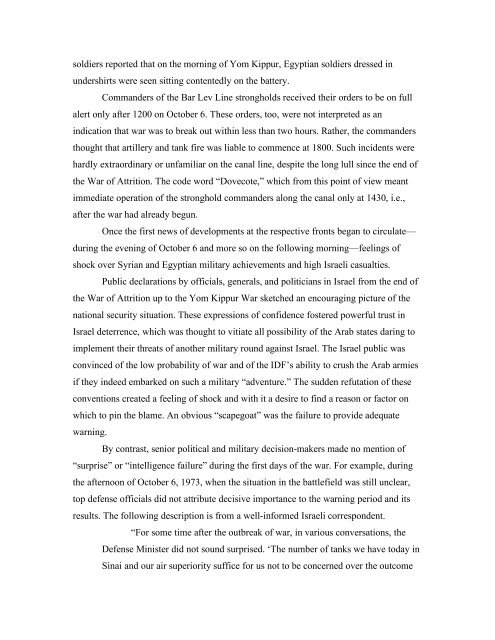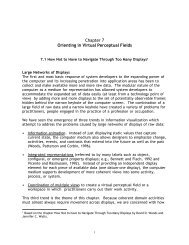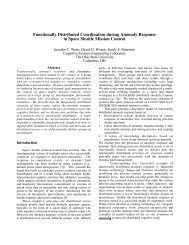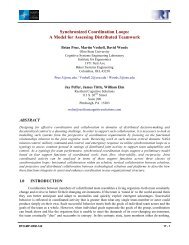Fundamental Surprises Zvi Lanir Decision Research 1201 Oak ...
Fundamental Surprises Zvi Lanir Decision Research 1201 Oak ...
Fundamental Surprises Zvi Lanir Decision Research 1201 Oak ...
- No tags were found...
Create successful ePaper yourself
Turn your PDF publications into a flip-book with our unique Google optimized e-Paper software.
soldiers reported that on the morning of Yom Kippur, Egyptian soldiers dressed in<br />
undershirts were seen sitting contentedly on the battery.<br />
Commanders of the Bar Lev Line strongholds received their orders to be on full<br />
alert only after 1200 on October 6. These orders, too, were not interpreted as an<br />
indication that war was to break out within less than two hours. Rather, the commanders<br />
thought that artillery and tank fire was liable to commence at 1800. Such incidents were<br />
hardly extraordinary or unfamiliar on the canal line, despite the long lull since the end of<br />
the War of Attrition. The code word “Dovecote,” which from this point of view meant<br />
immediate operation of the stronghold commanders along the canal only at 1430, i.e.,<br />
after the war had already begun.<br />
Once the first news of developments at the respective fronts began to circulate—<br />
during the evening of October 6 and more so on the following morning—feelings of<br />
shock over Syrian and Egyptian military achievements and high Israeli casualties.<br />
Public declarations by officials, generals, and politicians in Israel from the end of<br />
the War of Attrition up to the Yom Kippur War sketched an encouraging picture of the<br />
national security situation. These expressions of confidence fostered powerful trust in<br />
Israel deterrence, which was thought to vitiate all possibility of the Arab states daring to<br />
implement their threats of another military round against Israel. The Israel public was<br />
convinced of the low probability of war and of the IDF’s ability to crush the Arab armies<br />
if they indeed embarked on such a military “adventure.” The sudden refutation of these<br />
conventions created a feeling of shock and with it a desire to find a reason or factor on<br />
which to pin the blame. An obvious “scapegoat” was the failure to provide adequate<br />
warning.<br />
By contrast, senior political and military decision-makers made no mention of<br />
“surprise” or “intelligence failure” during the first days of the war. For example, during<br />
the afternoon of October 6, 1973, when the situation in the battlefield was still unclear,<br />
top defense officials did not attribute decisive importance to the warning period and its<br />
results. The following description is from a well-informed Israeli correspondent.<br />
“For some time after the outbreak of war, in various conversations, the<br />
Defense Minister did not sound surprised. ‘The number of tanks we have today in<br />
Sinai and our air superiority suffice for us not to be concerned over the outcome









